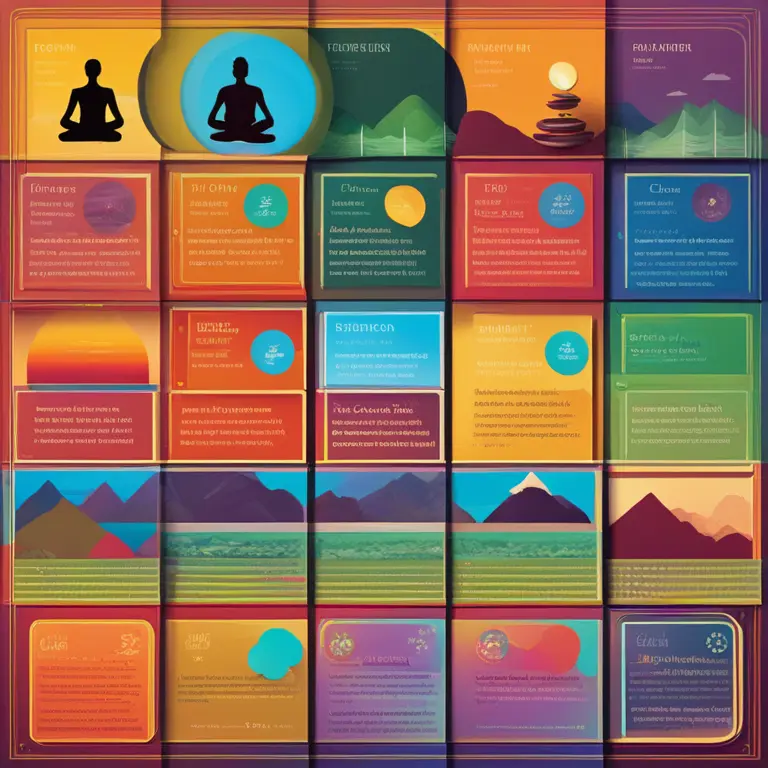
Meditation Techniques: Pathways to Inner Peace
Discover effective meditation techniques and learn about their benefits for mind, body, and spirit in today's fast-paced world.
article by Hina Kurosawa
Introduction to Meditation
Meditation, once an ancient practice, has now become a cornerstone of wellness in the modern era. As life accelerates with advancements in technology and ever-increasing demands on our time and attention, finding tranquility has become more valuable. Various forms of meditation offer a reprieve from the chaos, serving as a bridge to a more peaceful state of mind. In this article, we will delve into several meditation techniques and the myriad benefits they bestow upon practitioners.

Mindfulness Meditation
Mindfulness meditation is a practice that encourages acute awareness of the present moment. By focusing on breath or bodily sensations, practitioners learn to observe their thoughts and feelings without judgment. This technique has been brought to the forefront by the latest mindfulness movement, bolstered by smartphone apps and online courses designed to make meditation accessible to all. The benefits are profound, ranging from stress reduction to enhanced cognitive function.

Mantra Meditation
Mantra meditation utilizes the repetition of a sacred word or phrase to concentrate the mind. This practice, deeply rooted in various spiritual traditions, transcends linguistic boundaries by focusing on vibration and rhythm. In the West, transcendental meditation—a specific form of mantra meditation—has gained popularity, especially among celebrities and business leaders for its stress-relieving and performance-enhancing effects.

Guided Visualization
Guided visualization, also known as guided imagery, leads practitioners through a journey in their mind's eye, often aiming for a specific outcome like relaxation or healing. The rise of virtual reality (VR) and augmented reality (AR) has opened new horizons for this type of meditation, with immersive environments enhancing the experience and providing deeper relaxation or improved mental resilience.
Yoga and Moving Meditation
The integration of physical postures in yoga with breath and mindfulness constitutes a form of moving meditation. This practice strengthens the mind-body connection and promotes mental clarity and physical well-being. Advancements in wearable technology that monitor physiological responses have been instrumental in cementing yoga's place as a scientifically-backed approach to meditation, increasing its appeal.
Heart-Centric Meditation
Heart-centric meditation focuses on cultivating feelings of love, compassion, and gratitude. Pioneering research into heart-brain communication underscores the importance of positive emotions for cardiovascular health and overall wellness. By consciously directing attention to the heart area, practitioners can elicit a state of harmony and balance within the body.
Benefits Across the Board
Meditation offers a wealth of benefits that extend beyond stress relief. Scientific studies consistently demonstrate improvements in concentration, sleep quality, immune function, and pain management. Emotional well-being is enhanced with increased self-awareness, reduced anxiety, and greater emotional stability. As we look to the future, ongoing research is likely to solidify meditation's therapeutic potential in managing chronic diseases and mental health conditions.
Published: 2/12/2024
Modified: 2/12/2024
More predictions
Come back here soon to learn more about yourself and your future


The Harmonic Resonance of Meditation Music
Delve into the serene world of meditation music and discover how it amplifies your spiritual and astrological practices, guiding you toward inner peace and cosmic synchronicity.


The Heart of Meditation: A Journey Inward
Discover the heart of meditation, its benefits, and how to integrate this ancient practice into modern life for peace and self-discovery.


The Harmony of Meditation Music: A Journey Within
Discover the serene power of meditation music to enhance your mindfulness practice and spiritual pursuits on your personal journey.